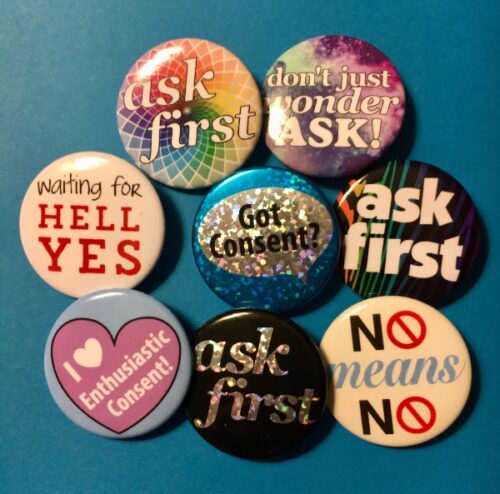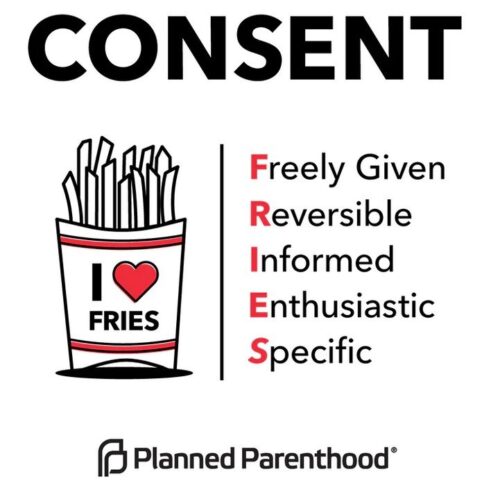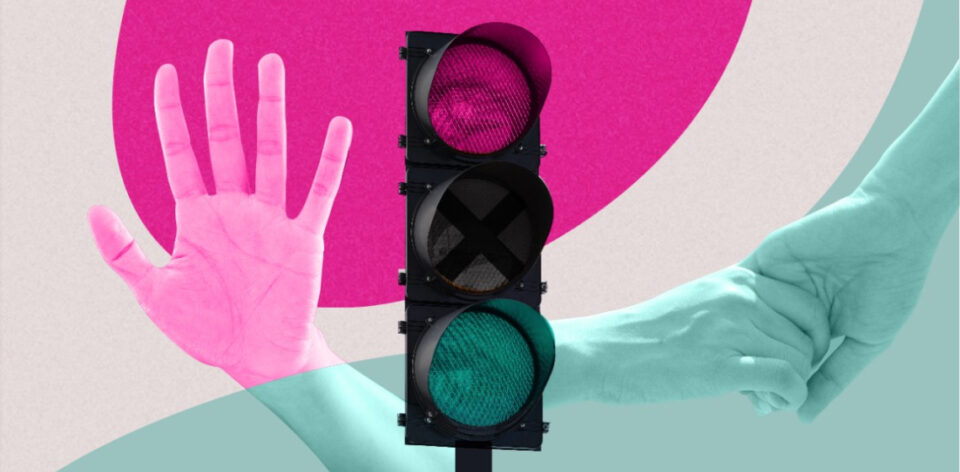Consent occurs when one person voluntarily agrees to the proposal or desires of another.
How often do you find yourself in a situation where you are not quite sure what your partner/acquaintance wants or if you can say NO and be safe, without harming anyone?
Unfortunately, we started talking about consent just quite recently. The older we are,the higher the chances we have misinterpreted consent or the lack of it in the past. It’s not our fault that we grew up in a culture of not understanding our own and other people’s boundaries. We were not taught to ask ourselves ’What do I want? Am I sure?’ and ’What do you want? Is it ok for you?’. We must learn this now, as adults.

As a person who is not quite delicate myself, I am afraid of missing a sign, or not acting when it’s expected from me. That’s why I did my little research and have been happily using those newfound principles for years. And I can assure you – they work!
As a starting point, let’s take a look on the FRIES concept, worked out by the American Planned Parenthood, to describe consent:
Understanding consent is as easy as FRIES.
Consent is:
- Freely given. Doing something (sexual) with someone is a decision that should be made without pressure, force, manipulation, or while drunk or high.
- Reversible. Anyone can change their mind about what they want to do, at any time. Even if you’ve done it before or are in the middle of having sex.
- Informed. Be honest. For example, if someone says they’ll use a condom and then they don’t, that’s not consent.
- Enthusiastic. If someone isn’t excited, or really into it, that’s not consent.
- Specific. Saying yes to one thing (like going to the bedroom to make out) doesn’t mean they’ve said yes to others (like oral sex).

Let’s start with a complicated topic: expressing consent.
We have to learn to recognize our own YESes and NOs, as quite often we will say YES automatically, without self-reflecting. It mostly affects women and people who grew up or were viewed by society as women. I’ve been kissed multiple times without being asked for consent and I kissed people without asking them first. Plenty of times first sex happened without enough communication.
No, you are not expected to say ’I XY explicitly grant you consent to touch your lips to mine and you are allowed to touch my labia, however penetration is not yet allowed.’ Some of us might be turned off by that, hehe. There is such a thing as an implied consent, consent which is not explicitly granted by a person, but rather implicitly by a person’s actions and the facts and circumstances of a particular situation, or in some cases, by a person’s silence or inaction.
Consent starts with questions. And first of all, asking those questions to yourself. When you are asking yourself ‘Do I want this?’ (to have sex, to kiss, to cuddle etc.) and your mind is responding ‘Yes!’ Right away – this is the consent you are looking for and you are indeed willing to do it. But whenever your answer, your feelings are responding ‘Well, seems like it’s a yes’ or ‘Probably’, or ‘Why not…’, ‘Anyway I have nothing to lose’ – then it’s not your clear ‘Yes’. And when your answer is not a Yes, then it’s a No.
Then what, shall I decline everything when I’m not sure? My FOMO won’t leave me alone. It’s a game and a testing technique you are using for your own sake, your goal is to develop sensitivity to your own boundaries. You can always tell your partner ‘I discovered that I need to figure out my own boundaries, I am learning to listen to my inner feelings. That’s why I decided that for some time, if I am not sure about my feelings and wishes, I’d rather say ‘No’.
Obtaining consent
The first and easiest way to make sure the person is fully into what you’re doing: ask. Verbal communication will not turn the person off, it will make them feel respected and heard, safe and comfortable. Personal experience talking here.
Tips for asking for consent
- Be direct by naming or describing the act clearly – “Can I kiss you?”
- Ask your partner(s) what they prefer: “What do you want to do?”
- Ask open-ended questions as a way of starting an ongoing dialogue about what each of you wants.
- Create space for your partner(s) to respond.
This is generic and applicable to most life situations. And don’t forget about FRIES! Consent always has to be freely given, reversible, informed, enthusiastic and specific.
Let’s talk about SEX
First of all – sex is whatever you are choosing to call ’Sex’. Each type of sex should be based on three safety principles:
- it must be safe for your sexual health
- it must be safe for your mental health
- it must be based on consent

How do you start talking about sex freely, how do you deal with your fears and shame and figure out your desires? I prepared a cheat sheet for you with basic questions:
1. What do you like? How do you like to be intimate? What is especially important for you to enjoy it?
Why do that? To draw a picture from both partner’s perspectives and to avoid hurting them with your possibly false expectations. Ask open questions. It will allow your partner to communicate more easily.
Trick: open the conversation, go first. It’s hard to speak about one’s preferences, to talk about private and personal stuff, girls feel vulnerable about it. It’s easier to speak about it after someone has opened up already.
2. Is there something you usually don’t like? What is absolutely not acceptable for you? What are your taboos?
This sets the boundaries and helps to avoid clumsy moments. It is worth clarifying about popular practices: often we automatically expect a person to enjoy fingering, to be in receiving position, kissing with tongue or breast touches – but there are many people who do not like these.
3. Do you prefer to top or to bottom? Or are you rather versatile/switch?
Many found themselves in situations where they had to act out roles that were unusual for them. Think what will you do if both of you are tops? It’s better to discuss in advance than be disappointed in the middle of the process.
4. Do you need to orgasm to feel satisfied? Would you like to share your trigger points?
Not everyone likes to come. It’s especially important during first sex, when we don’t know about the other person’s body sensitivity yet (as well as about our reactions to their actions). So, it makes sense to once again ask clarifying questions.
5. Shall we come up with a safe word? Just to be on the safe side. Which one would you choose?
The safe word, or stop word is often associated with kinky sex, but even in more relaxed sex, it is still a useful tool. A safe word has to be chosen in a way so that it is not associated with sex talk. For example, “pineapple”, “lightbulb’ etc. You can use it if it suddenly becomes awkward to say: “let’s stop.” It’s a safe way to be clearly understood immediately.
6. Do you have any particular desires that you would like us to do? What do you imagine when you are thinking about us being intimate?
Sometimes we have desires that do not fit into our classic “how I usually have sex.”
7. Bonus question for brave ones. You can use in the very beginning: Are we flirting now?
Why ask this?
- Everything becomes clear
- You avoid breaking anyone’s boundaries. If you get a negative answer, you can ve grateful that nobody got hurt by setting false expectations
Making the situation hotter. If the answer is positive you can move onto the next step

